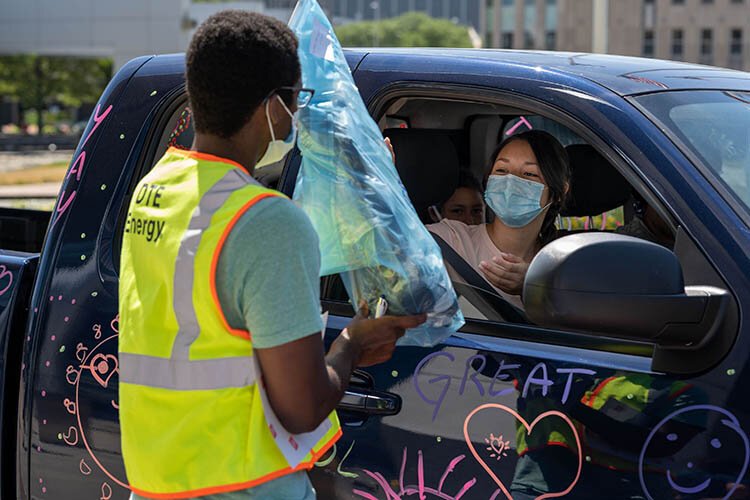These Detroit workforce development programs aim to eliminate barriers to employment for youths
Now with many youth also needing to step in to provide income for their families as parents have been laid off or are facing reduced hours due to the crisis, the programs become more important than ever. They’re also opportunities for youth who need to pivot career paths from pandemic-impacted industries like hospitality and tourism to more stable job opportunities in the immediate future.

As Detroit’s economy continues to be impacted by the COVID-19 pandemic, a number of organizations and businesses throughout the city are taking strides to provide youth with job employment opportunities and training.
These programs not only provide youth with technical and career skills needed to succeed in the workforce, but they teach soft skills such as interviewing, preparing a resume, and dressing for success. According to Detroit Employment Solutions Corporation, 27.8% of Detroit youth ages 16-19 were unemployed in 2019, while 18.5% of youth ages 20-24 were unemployed, making initiatives carried out by organizations such as Grow Detroit’s Young Talent, The Greening of Detroit, and DTE Energy, among others, crucial for economic growth.
Now with many youth also needing to step in to provide income for their families as parents have been laid off or are facing reduced hours due to the crisis, the programs become more important than ever. They’re also opportunities for youth who need to pivot career paths from pandemic-impacted industries like hospitality and tourism to more stable job opportunities in the immediate future.
Here’s a look at how programs throughout the city are helping young Detroiters build careers from creating green spaces to learning skilled trades.
Grow Detroit’s Young Talent
At Grow Detroit’s Young Talent, a citywide summer jobs program employs youth ages 14-24. Powered by the City of Detroit, GDYT is available to permanent residents of the city who are eligible to work in the United States. Even with the pandemic, the program has still been able to fulfill their annual goal of helping approximately 8,000 youth gain meaningful summer employment. They work in a variety of industries, including but not limited to event planning, accounting, retail, health care, and manufacturing.
The program features three tiers aimed at different opportunities. Tier 1 introduces youth new to the workforce to early career opportunities and job shadowing, often serving teenagers ages 14-16. Tier 2 is for youth with some previous work experience who want to continue building their skills. Tier 3 is a more intensive program for youth who want to explore a specific career path with a host employer.
“Our mission is to ensure that all youth in the City of Detroit have access to economic opportunity,” Marie Hocker, GDYT executive director, explains. “Your upward mobility is going to be limited if you don’t have access to great job opportunities and stepping stones.” The program aims to focus on addressing an intergenerational cycle of poverty that can be found throughout the city, Hocker says, and to give young people a chance to discover longer-term career paths.
This year, approximately 6,100 youth serviced by GDYT had a virtual work experience, with a little under 2,000 continuing to work onsite. “We reserved those [onsite] experiences for older youth,” Hocker says, because they’re more able to make safety decisions. Any youth who worked on site were provided with Personal Protective Equipment. For the youth who did work remotely, standard measures were taken to ensure they received a proper combination of hard and soft skills training that could be applied to future job endeavors.
Each year, GDYT receives approximately 16,000 applications and accepts about half to enroll in the program. Applications open as early as January and the program also recruits at Detroit Public Schools. Hocker says youth can choose which fields they pursue and that the program works with a number of local businesses including Ford Motor Company to place youth in the appropriate roles. “Even with the pandemic, it’s so important that we continue working with our youth to build their skills,” Hocker explains. “When it’s over, we want to ensure that they will be able to land in a great place.”
The Greening of Detroit
For youth who participate in The Greening of Detroit’s summer initiative, the approach is a little different — and also benefits the environment. The organization’s Green Corps Summer Youth Program teaches youth how to give back to the earth. Having planted more than 130,000 trees since 1989, The Greening of Detroit’s summer program was developed to help youth become involved in creating and maintaining green spaces.
“It’s a way for us to introduce youth to natural resource-related fields,” President Lionel Bradford says. “We expose them to careers that they don’t normally get a chance to get exposed to.” Youth can learn skills that can set them up for success in career paths such as ecology, science, and park maintenance. “They don’t know that they can become a soil scientist, for example,” Bradford says, but the program — which involves partnerships with the Forest Service, DNR, and EPA — adds enrichment elements that teach youth how to apply what they learn at Green Corps in real-life settings.
Bradford says that 97% of their students, who range in age from 14-18, go on to graduate and pursue higher education, while just over 25% continue to stay in natural resource-related fields. The eight-week program averages about 100 youth each summer and has seen up to 200 youth at its peak. Additionally, Green Corps helps with ACT and SAT training and prep, which helps ensure youth are ready for college. They also teach nutrition, interviewing, and resume writing to all participants.
“The pandemic has taught us to slow down and really focus,” Bradford says. “We have to make sure that we do our part to introduce kids to the workforce and make sure they have the skills and resources they need to be successful.”
DTE Energy
With a number of programs throughout the city, DTE Energy offers a variety of workforce development opportunities for youth and college-aged students. A robust internship program, which was mostly virtual this year due to COVID-19, teaches youth about careers in accounting, marketing, communications, human resources, and more. “We have great employees and leaders who help these students gain skills and mentor them,” says Tracy DiSanto, workforce planning, development, and compliance manager.
DTE hires on average 850 students on site each year and sponsors around 650 students through different foundation-sponsored programs around the state. Their summer youth internship program is designed for graduating high school seniors and teaches office, professional, or skilled trades positions. Youth are also taught soft skills such as resume writing, interviewing, and using Microsoft Office. They work closely with Grow Detroit’s Young Talent on placing youth in their various business sectors.
A second program created in partnership with Henry Ford College, Power and Trades Pathways, helps ensure students can access high-paying jobs in the energy field, which can be competitive and difficult to break into, DiSanto explains. It focuses on gas and electric technician positions, along with construction programs to provide resources for youth to receive practical training early on in their careers. About 100 students participate at any given time, she says.
This year, anyone who participated in DTE’s virtual workforce programs received a laptop and IT support to ensure they could connect at home and access materials. “The students that come to work for us, whether they have barriers or are looking to get exposure in the energy industry, are a part of our community,” DiSanto says. “It’s important for us to support them and build that pipeline.”
Especially now throughout the pandemic, DiSanto notes staying focused on providing work opportunities is more crucial than ever. “We want to ensure that we keep that pipeline filled,” she says, “and that these individuals continue to get training.”



